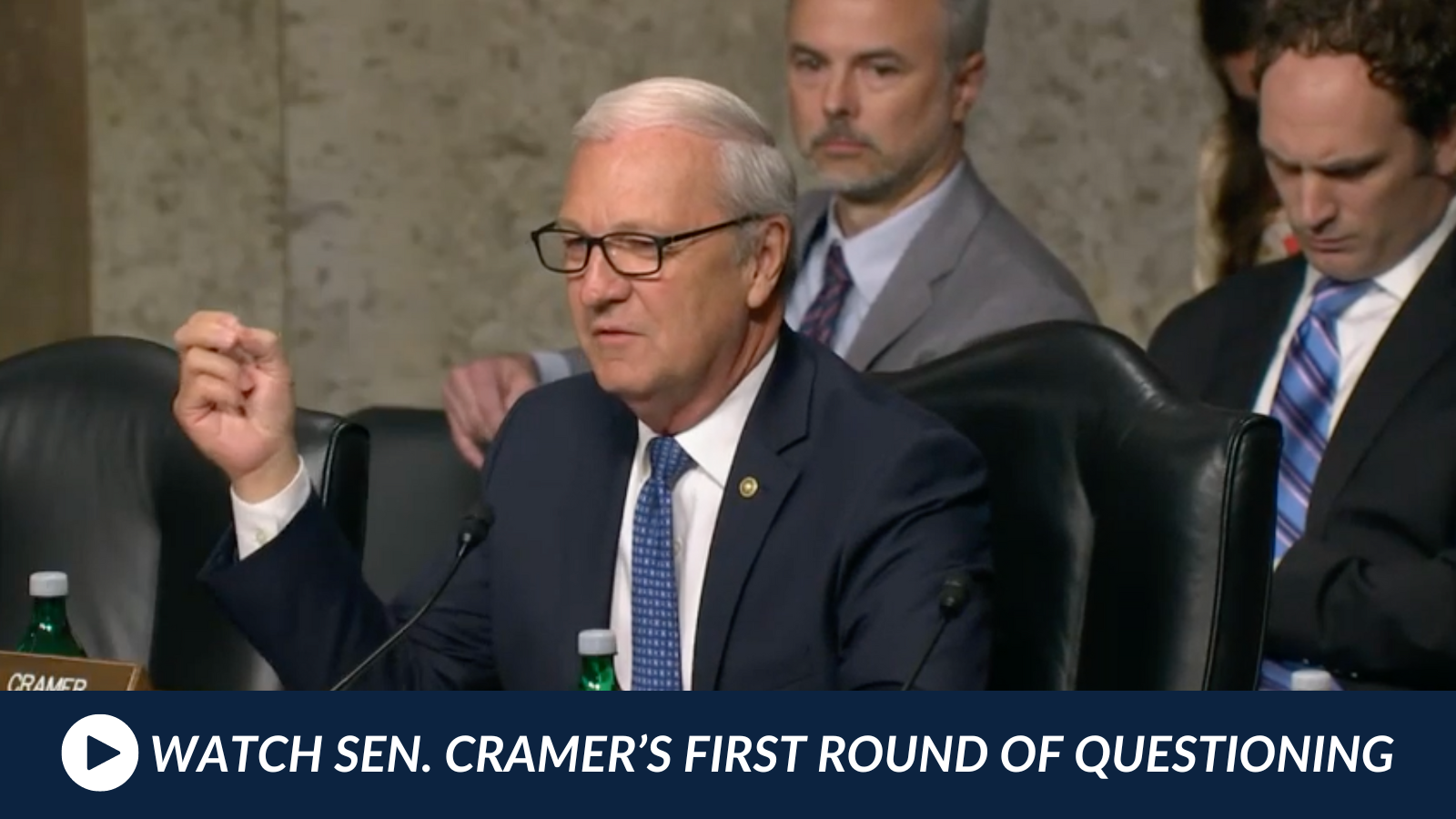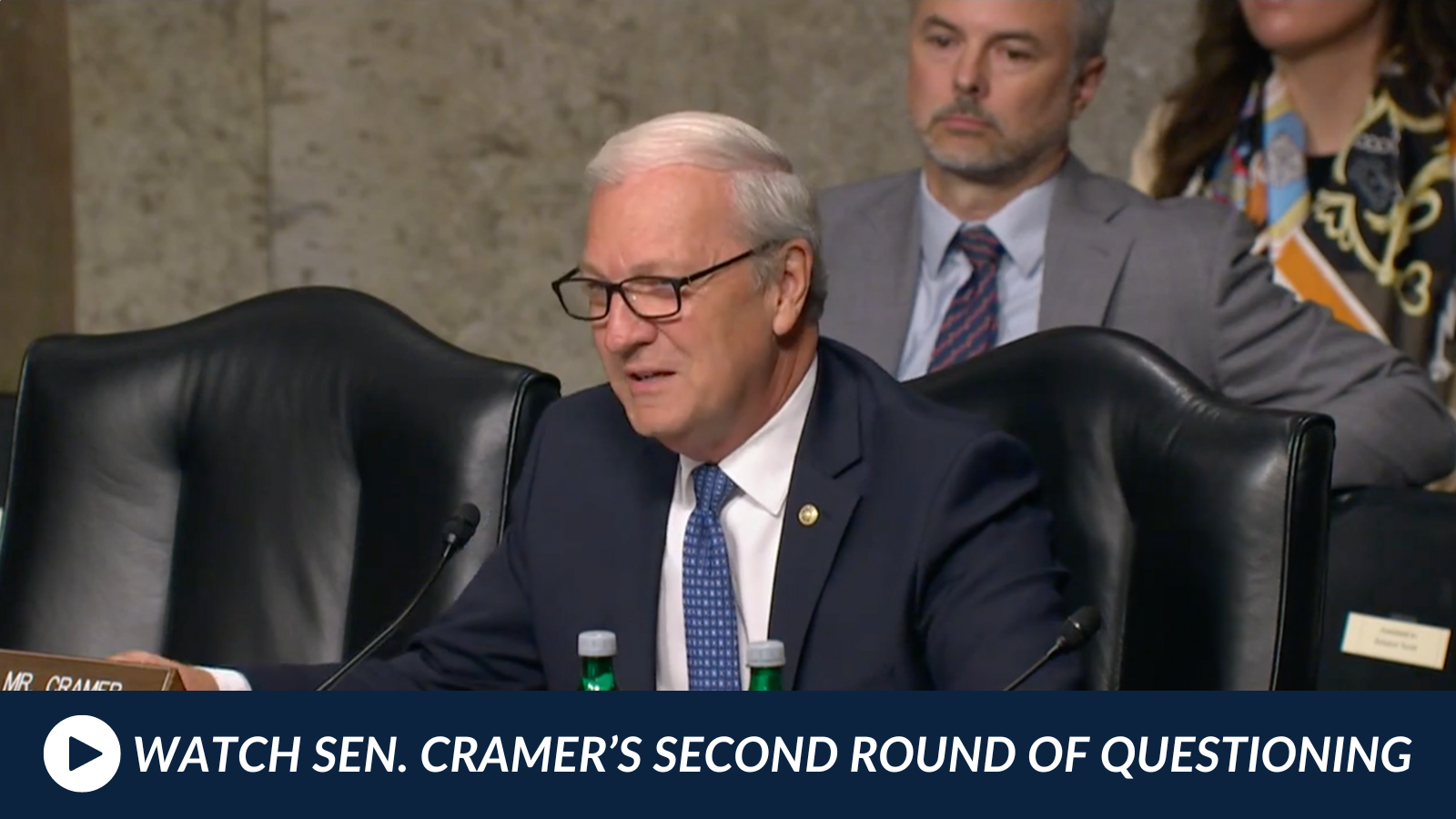***Click here to download video. Click here for audio.***
WASHINGTON—U.S. Senator Kevin Cramer (R-ND) questioned General David W. Allvin, nominee to be Chief of Staff of the Air Force (CSAF), about intelligence, surveillance, and reconnaissance (ISR) capabilities during a Senate Armed Services Committee (SASC) confirmation hearing. General Allvin commanded the 905th Air Refueling Squadron in Grand Forks, ND, from 2001 to 2003.
The CSAF is the highest-ranking officer in the U.S. Air Force and is responsible for the organization, training and equipping of 685,000 active-duty, Guard, Reserve, and civilian forces serving in the United States and overseas.
Click Here to Watch Senator Cramer’s First Round of Questioning

Senator Cramer began by questioning General Allvin on the most recent budget overview for Fiscal Year 2024, which does not mention the future or transition of ISR.
“Am I reading something wrong, General? Is the Air Force trying to get out of the ISR business altogether, like this year?” asked Senator Cramer.
“Absolutely not. […] As we look at the ISR of the future, we're trying to transition to something that is platform centric to something that is system centric, because if we focus on ISR as we have in the past, sometimes those platforms are a little bit more vulnerable rather than how they can approach the system […] We’ve had conversations on this about making sure we maintain to the extent that we can, the capabilities throughout this transition as we leverage what we think can be more persistent, accessible, survivable, and connected,” responded General Allvin.
“I've had a number of Space Force officials like yourself sitting where you're sitting, and they're pretty clear the transitions are a ways off before they can take it and run with it as the exclusive platform. The transition has to involve something other than keeping the last nine R-Q4s flying, which at this point two or three I think are capable of flying. Is there a transition in place for new aircraft?” asked Senator Cramer.
“There is. The idea of being able to leverage some of the platforms […] as well as some of the other domains we want to integrate the data to be able to have that fused ISR. […] We will be looking at trying to manage that risk until we get to that future leveraging all those platforms, whether they be RC-135 version or some maintaining the R-Q4s or some of the other sensors we have that can put together this picture,” responded General Allvin.
Senator Cramer then mentioned the Air Force’s plan to establish affordable, rapid, and adaptable aircraft as a force multiplier companies can use, while reiterating his concerns over new acquisition formats and rules and defaulting to the same congested airspace.
“I happen to come from a place that has really great airspace for new innovations. […] As you know, part of [Grand Forks Air Force Base] is now a private Sky Park where Northrop Grumman, General Atomics, and others are testing remote piloted aircraft, obviously training pilots from all over the world, not just our own. TRMC is outfitting all R-Q4s to help us better test hypersonic missiles, yet the future of the base is uncertain to me. I just would love to hear why Grand Forks wouldn't be a better place than the desert, other than the sunshine and its proximity to the ocean or something like a [collaborative combat aircraft] where real innovation takes place on both sides of the fence at that base,” asked Senator Cramer.
“I will tell you we're not committed to a specific location, but I will tell you that integral to our force design of the future, we are committed to collaborative combat aircraft. They are defining one of the core elements of what we believe the Air Force needs to do in the future, which is better human machine teaming, which is better having affordable mass. […] We're not committed to the desert at all, and I certainly do appreciate the value of Grand Forks. Having been there as a Squadron Commander, I certainly look forward to coming back I believe next month,” responded General Allvin.
“Let me stress for the people who like the sunshine of the desert and the proximity to the ocean that a lot of future wars could be fought in the Arctic and in very, very cold places. I think we [Grand Forks Air Force Base] have an awful lot to offer,” concluded Senator Cramer.
Click Here to Watch Senator Cramer’s Second Round of Questioning

Senator Cramer then asked General Allvin whether he is committed on behalf of the Air Force to seeing through the modernization and completion of all three bases hosting ICBMs.
“Thanks for the shoutout to the 100-year-old B-52. It’s incredible, but the Sentinel modernization is equally important to us. Are you committed on behalf of the Air Force to see this modernization through to all three bases?” asked Senator Cramer.
“I'm absolutely committed and if for no other reason than it's required,” responded General Allvin. “The idea we now have another country who was fielding nuclear capabilities in a very rapid pace, we will have an even more complex nuclear deterrence environment.”
Senator Cramer thanked General Allvin for accepting his invitation to visit North Dakota, along with General Saltzman, Chief of Space Operations at U.S. Space Force. Together, they plan to attend the 17th annual Unmanned Aerial Systems (UAS) Summit and discuss the private and civilian partnerships between Grand Forks Air Force Base, and other local leaders.
“What General Atomics is doing, training our pilots and our allies’ pilots with Northrop Grumman, their operations are incredible. TRMC’s use of the R-Q4s is remarkable stuff. I want you to see that innovative ecosystem that's been created and enhanced by the University of North Dakota. Just last week, I was there to celebrate the very first national security fellowship at the at the School of Engineering. We created that ecosystem, and even the FAA recognizes and allows us in our radar system to test beyond visual sight. […] I just want to take full advantage of you and General Saltzman together [at the Summit] and have these various conversations about the future,” concluded Senator Cramer.